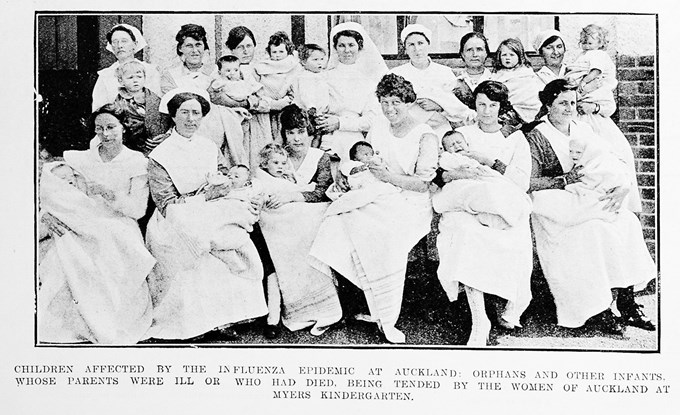This week we’re approaching the anniversary of a tragic and often-overlooked chapter of New Zealand’s history – the 1918 influenza pandemic.
To mark the occasion, Waitākere Ranges Local Board is hosting a centenary commemoration service as part of Auckland Heritage Festival. Several historians will speak including military historian Dr Stephen Clarke and heritage researcher Marguerite Hill.
Following the service, the Waikumete Discovery group will provide an opportunity to look at some influenza graves and hear the stories behind them. The Waikumete office team will be there if you want to locate relatives in the cemetery.
The pandemic took more lives worldwide than the entire First World War, and in New Zealand alone was responsible for nearly 9000 deaths in only a few short weeks. Today, that would be the equivalent of losing 30,000 people, roughly the population of Taupo.

About the pandemic
The influenza pandemic was the largest worldwide 'medical holocaust' on record – infecting one-fifth of the world's population and in a few months caused more deaths than the infamous four-year bubonic plague outbreak of the 1300s.
We still don’t fully know the pandemic’s origin. It was first noticed in January 1918 in Kansas USA, spread rapidly across the mid-west and is believed to have been spread overseas by soldiers travelling to Europe.
Life in Auckland
The disease arrived on our shores in September 1918, just as World War I drew to a close.
Disorganised quarantine efforts enabled it to spread quickly. Around the country life ground to a halt – shops, offices and factories shut, schools, hotels and theatres closed and shipping ceased putting basic items like flour and sugar in short supply.
You likely would have been sick yourself or – if you managed to escape the sickness – busy tending to family and friends. Nurses, doctors, and groups like the Red Cross, St Johns and Army Medical corps rallied to care for the sick, often to then be struck down themselves.
"Everyone was sick, no one to help, they were dying one after the other. My father was very, very sick then. He was the first to die. I couldn't do anything for him." - Dame Whina Cooper
Even as the country celebrated Armistice Day in November 1918, the death toll was rising. As hospitals and morgues struggled to cope, temporary hospitals were pulled together in homesteads and temporary morgues were set up in Victoria Park.
Waikumete normally had about 50 burials a month and at the pandemic’s peak they were burying 70 people a day.
During one of the darkest weeks, the Catholic Church cancelled their services because clergy were busy running funerals and administering last rites. Māori were seven times more likely to die, with over 2000 deaths throughout New Zealand.
Legacy
No other event has killed so many New Zealanders in such a short time.
The stunned and grief-stricken public sought answers from the government – the tragedy prompted the 1920 Health Act, a restructure of the health system and a strengthening of sanitary measures.
"[The 1920 Health Act] is the most useful legacy of the pandemic. At the time it was widely recognised as a model piece of health legislation.” – Historian Geoffrey Rice
Commemoration Service Details
- Sunday 30 September
- 11am-12pm
- Waikumete Cemetery, 1128A Great North Road, Auckland
- Free
RSVP to civicevents@aucklandcouncil.govt.nz or come along on the day.
More information can be found here.
Auckland Heritage Festival 2018 celebrates our unique heritage with over 200 events across Auckland from 29 September to 14 October. Visit heritagefestival.co.nz for the full Auckland Heritage Festival programme.

